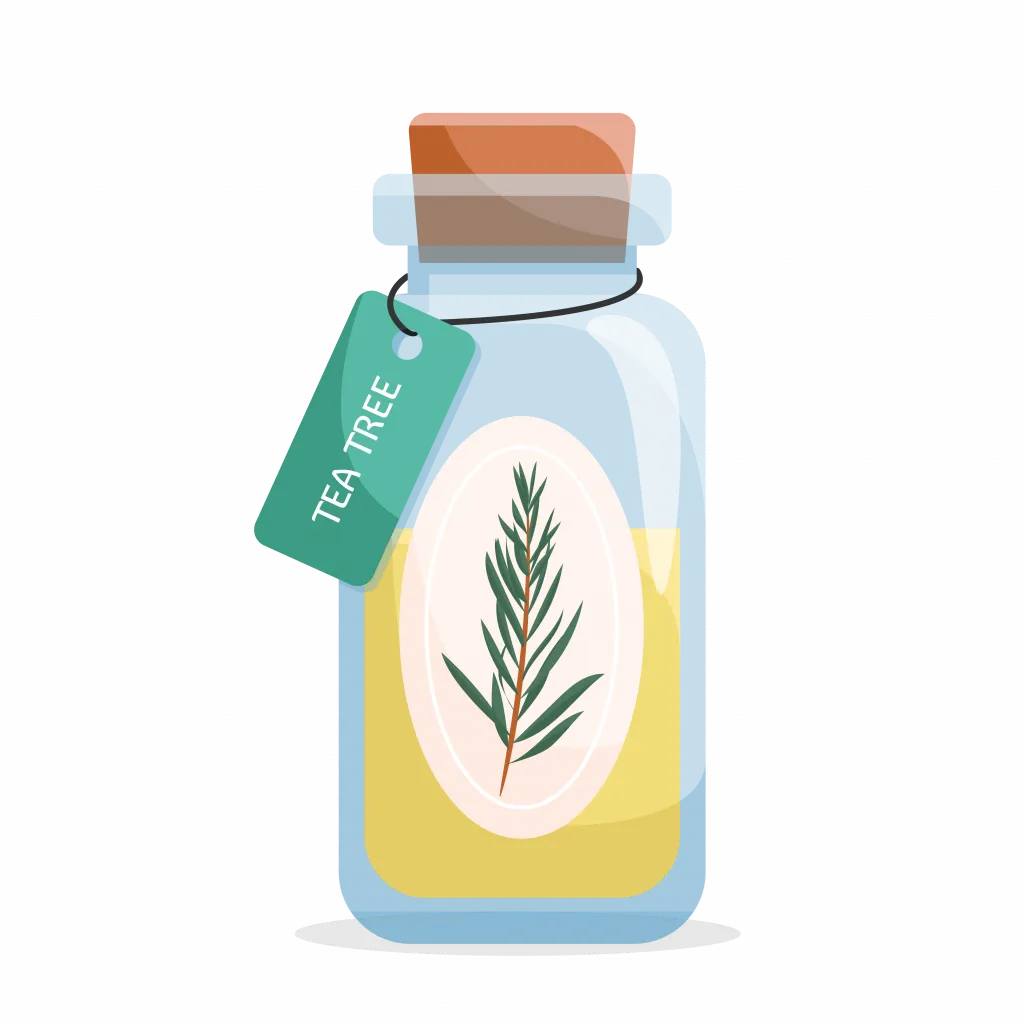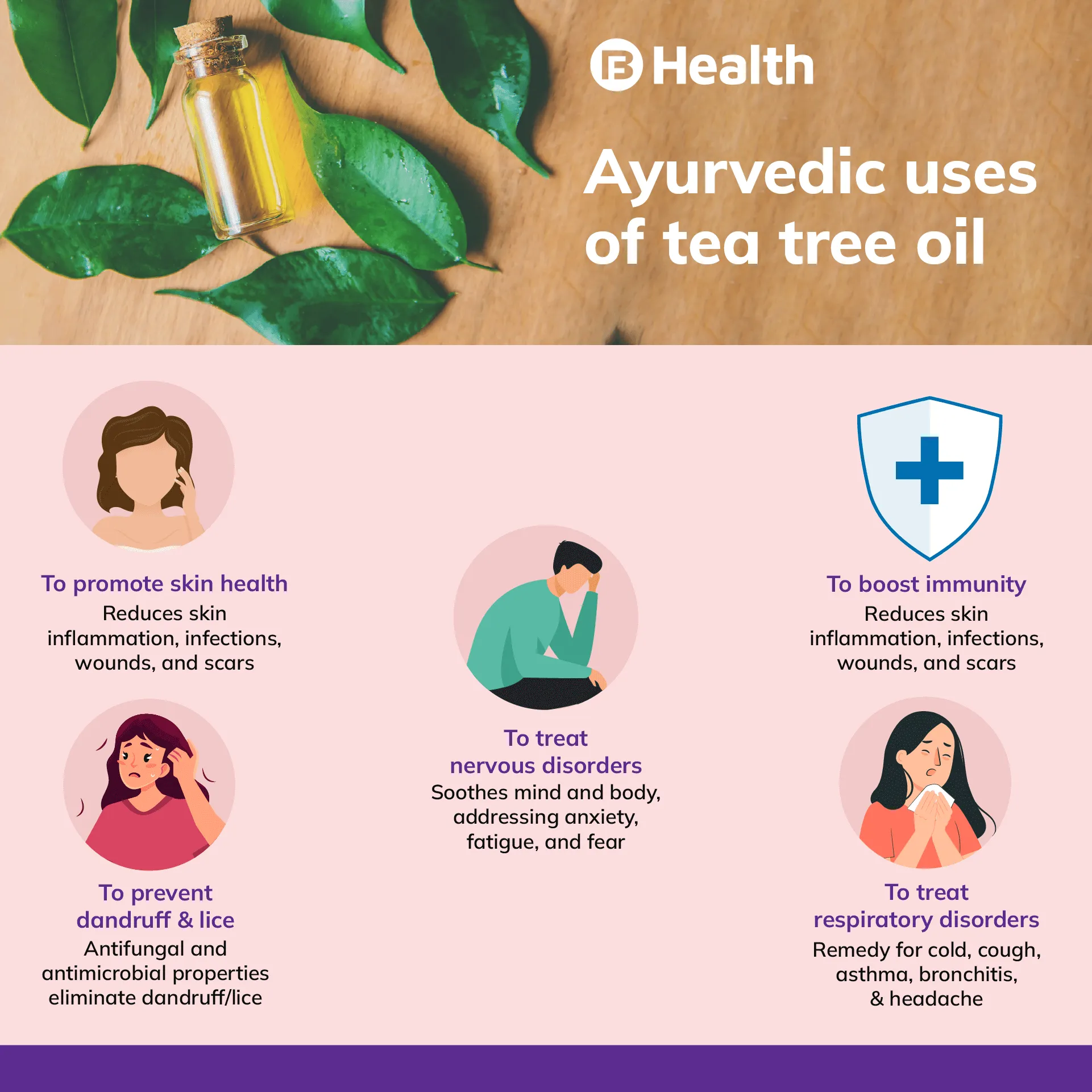Ayurveda | 9 min read
Tea Tree Oil: Uses, Benefits, Facts, and Risks
Medically reviewed by
Table of Content
Key Takeaways
- Tea tree oil is used to prepare topical medicines
- Tea tree oil benefits to reduce itching and swelling
- Tea tree oil has anti-inflammatory and anti-microbial properties
Tea tree, scientifically known as Melaleuca alternifolia, is commonly found in Australia. Tree tea oil benefits you in many ways. It has been in use for treating skin diseases for over a century [1]. Tea tree oil uses are many as it can be used as an antiseptic, a home cleaner, or to treat dandruff. Besides, the oil is inexpensive and is considered safe for external use.
Tea tree oil is used to prepare topical medicines too. Research has found that it has anti-inflammatory and antimicrobial properties capable of eliminating bacteria and viruses [1, 2]. Take an ayurvedic route to care for your body by using tea tree oil. Read on to find out the uses of tree tea oil for face, skin, and hair.
What Is Tea Tree Oil?
Melaleuca alternifolia, a tiny tree that is native to Queensland and New South Wales in Australia, produces tea tree oil and is known for various tea tree oil benefits.The plant whose leaves are used to brew black, green, and oolong tea should not be confused with Melaleuca alternifolia, often known as the tea tree.
The Australian Aboriginal population has long utilized tea tree oil as a traditional medication. These indigenous Australians smash tea tree leaves to extract the oil, which they either directly apply to the skin for healing or inhale to cure coughs and colds.
Tea tree oil uses include chemicals, including terpinen-4-ol, which have been demonstrated to fight bacteria, viruses, and fungi.
Terpinen-4-ol also appears to boost the activity of white blood cells, which aid in the battle against infections and other external invaders.
Tea tree oil is a valuable natural medicine for treating bacterial and fungal skin diseases, avoiding infection, and encouraging healing due to its germ-fighting characteristics.
Tea Tree Oil Benefits
Assists In Clearing Up Acne
Tea tree oil is an effective acne therapy due to its anti-inflammatory and anti-microbial properties. It is just as effective as benzoyl peroxide. It is intended to lessen redness, edoema, and inflammation. It penetrates the pores to expel pollutants and prevent obstruction. Additionally, it lessens and lightens scars. Tea tree oil restores the body's natural oil balance.
Tea tree oil takes some time to work, but 45 days of consistent usage may do miracles for your skin. Apply a tea tree oil-containing gel for the best effects. It penetrates the pores to clear impurities and prevent obstruction. Additionally, it lessens and lightens scars. The natural oil balance of the body is restored by tea tree oil. Tea tree oil takes time, but 45 days of consistent usage may work wonders for your skin. Apply a tea tree oil-containing gel for the best effects.
Enhances Healthy Skin
The finest oil to use - tea trees benefits the skin. It gives your skin a gorgeous, radiant appearance and benefits your skin. In addition, its high antioxidant content helps to smooth and moisturize the skin.
Keeps Skin Cancer At Bay
Tea tree oil may be able to aid in the battle against skin cancer. It helps to decrease malignant tumors.
Treatment For Fungus In The Nails
Nail fungus infections are common but difficult to treat. To get rid of nail fungus, use tea tree oil alone or in combination with other natural treatments. Put a few drops of tea tree oil on the affected area directly, or mix it with equal parts coconut oil.
Helpful For Respiratory Issues
Due to its numerous anti-inflammatory properties, tea tree oil is an effective treatment for respiratory problems. It helps clear throat and nasal mucus blockages since it is a potent expectorant. Additionally, it is effective for diseases including TB, asthma, and bronchitis.
Encourages Dental Health
Tea tree oil is said to fight against the microorganisms that cause tooth decay and other conditions, including mouth irritation and bad breath. You may use tea tree oil as a chemical-free mouthwash by adding a drop to half a cup of water and swishing it around in your mouth for 30 seconds.
Additional Read: Coconut Oil Benefits
Tea Tree Oil to Stop Hair Fall and Remove Dandruff
Hair fall and dandruff can be annoying and disturbing. However, tea tree oil’s anti-flake, anti-fungal, and anti-inflammatory properties can hydrate your scalp, control dandruff, and stop hair fall. Many ayurvedic and cosmetic products use tea tree oil as it helps fight dry skin, soothes the scalp, and promotes hair growth. In fact, a 4-week study on participants using tea tree oil shampoo found a 41% improvement in dandruff relief. Significant improvements were also reported in dandruff severity, itchiness, and greasiness [3].
Tea Tree Benefits for Skin
There are many tea tree benefits for skincare. It can unclog pores, reduce itching, swelling, redness, and heal acne. A study reported that participants who used face products with tea tree oil reported better hydration and reduction of oiliness, and size of pores [4]. The components of the tea tree can bring a glow and have whitening effects on your skin due to its antioxidant properties. You can use tea tree oil in a body wash, face wash, and lotion to hydrate your skin and reduce dryness, inflammation, and itchiness. The antifungal properties of tea tree oil also help cure ringworm fast by killing the fungi that cause it.
This Oil Benefits as a Hand Sanitizer
Tea tree oil makes a perfect replacement for market hand sanitizers as it can be used as a natural purifier. The chemical components in a tea tree provide antiseptic and antibacterial properties that help kill germs on the surface of the skin. This prevents any infection from entering your body. Studies have also reported that tea tree oil eliminates disease-causing bacteria and viruses [5]. Another study found that adding tea tree oil to hand washes boosts their effectiveness [6].

Tea Tree Oil as an Insect Repellent
Tea tree oil uses include its efficacy as a repellent against insects. It has a unique aroma and chemical composition that makes it a great insecticide. A test-tube study reported that tea tree oil has more ability than DEET (an active component in insect repellents) to ward off mosquitoes [7].
Tea Tree Oil as a Natural Deodorant
Did you know your sweat itself doesn’t have any smell? When the bacteria on your skin mixes with the secretion from your sweat glands, it produces body odor. Use tea tree oil as a natural deodorant as its antibacterial properties help control body odor caused by perspiration. This makes it an ideal alternative to commercial antiperspirants and deodorants.
Five Possible Uses Of Tea Tree Oil
Antibacterial
In Australia, the oil has been used as a curative for about 100 years, mostly for skin disorders. It is used now to treat a variety of ailments.
The majority of people are aware of tea tree oil's antibacterial capabilities. The oil's capacity to harm bacterial cell walls accounts for its broad-spectrum antibacterial effect. More study is required to comprehend how it could operate.
Anti-inflammatory
Due to its high content of terpinen-4-ol, a substance with anti-inflammatory effects, tea tree oil may help reduce inflammation.
In animal experiments, terpinen-4-ol was found to lessen inflammation in oral infections. Tea tree oil was more effective than paraffin oil at reducing edema in histamine-induced skin inflammation in humans when applied topically.
Antifungal
Reviewing tea tree oil's efficacy reveals that it has the power to eradicate a variety of yeast strains and fungi. The bulk of the research under consideration concentrates on Candida albicans, a form of yeast that frequently affects the mouth, throat, genitalia, and skin.
In situations of resistant bacteria of Candida albicans, further study shows that terpinen-4-ol increases the effectiveness of fluconazole, a standard antifungal medication.
Antiviral
There has been minimal study in this area. However, some studies suggest that tea tree oil helps cure certain infections.
Dermatitis from contact
Eczema in the form of contact dermatitis is brought on by coming into touch with an allergen or irritant. Tea tree oil has been proven effective in treating contact dermatitis when compared to zinc oxide and clobetasone butyrate.
According to the results, tea tree oil was superior to other therapies in reducing allergic contact dermatitis. However, it had little effect on irritative contact dermatitis.
Remember that some people may get allergic contact dermatitis from tea tree oil alone. [1]
Fast Facts About Tea Tree Oil
- The leaves of the Australian shrub Melaleuca alternifolia are used to make tea tree oil.
- The oil is antibacterial, antiviral, antifungal, and anti-inflammatory.
- Athletes' feet, contact dermatitis, acne, and head lice can all be treated with tea tree oil.
- Never consume tea tree oil orally.
Precautions For Tea Tree Oil
When using orally:
Tea tree oil is probably dangerous; do not take tea tree oil orally. The ingestion of tree tea oil has resulted in significant adverse effects such as bewilderment, difficulty walking, unsteadiness, rash, and coma.
Applying on the skin:
Tea tree oil is likely safe for most people when applied to the skin. There are several tea tree oil benefits for the skin. However, it has the ability to cause skin irritation and edema. It can occasionally cause skin dryness, itching, stinging, burning, and redness in acne patients. Tea tree oil is possibly safe to use during pregnancy and breastfeeding. If consumed orally, it is most certainly dangerous. Tea tree oil can be harmful if consumed.
Children:
When used orally, tea tree oil probably poses a health risk. Serious adverse effects from it include coma, rash, difficulty walking, disorientation, and unsteadiness. It could be OK to use tea tree benefits for the skin. But it could swell and irritate the skin. Acne patients may feel skin redness, dryness, itching, stinging, burning, and other unpleasant sensations.
Cross-reactions:
Using tea tree oil may cause stinging and burning on the skin in those who have allergies to other plants.
Risks and Side-Effects of Tea Tree Oil
Although using tea tree oil is safe, it may lead to mild side effects in some, especially those with sensitive skin. Be cautious while using it around wounds, rashes, or irritated skin. Tea tree oil can sometimes cause dryness, burning, and redness in people with acne. If you are using the oil for the first time, test it out to be safe from allergies. Keep the oil away from your eyes if applying to the face. Do not swallow it as it can be toxic and lead to confusion and unsteadiness and cause rashes. If you are pregnant or have any existing health conditions, consult with your doctor before using it.
Additional Read: Jojoba Oil Benefits for HairAlthough there are many tea tree oil benefits, research the purity of the oil before you buy it. It is always better to consult a dermatologist before using any essential oils on your skin. For professional guidance on the usage of ayurvedic products, consult with AYUSH specialists on Bajaj Finserv Health. You can Online Doctor Consultation from the comfort of your home and take care of your skin, hair and health using natural products.
References
- https://pubmed.ncbi.nlm.nih.gov/16418522/
- https://pubmed.ncbi.nlm.nih.gov/27388769/
- https://pubmed.ncbi.nlm.nih.gov/12451368/
- https://clinmedjournals.org/articles/ijdrt/journal-of-dermatology-research-and-therapy-ijdrt-2-032.php?jid=ijdrt#ref13
- https://pubmed.ncbi.nlm.nih.gov/16418522/
- https://pubmed.ncbi.nlm.nih.gov/15694979/
- https://pubmed.ncbi.nlm.nih.gov/26412058/
- https://www.medicalnewstoday.com/articles/326376#:~:text=Several%20treatments%20for%20contact%20dermatitis,effect%20on%20irritant%20contact%20dermatitis.
Disclaimer
Please note that this article is solely meant for informational purposes and Bajaj Finserv Health Limited (“BFHL”) does not shoulder any responsibility of the views/advice/information expressed/given by the writer/reviewer/originator. This article should not be considered as a substitute for any medical advice, diagnosis or treatment. Always consult with your trusted physician/qualified healthcare professional to evaluate your medical condition. The above article has been reviewed by a qualified doctor and BFHL is not responsible for any damages for any information or services provided by any third party.





